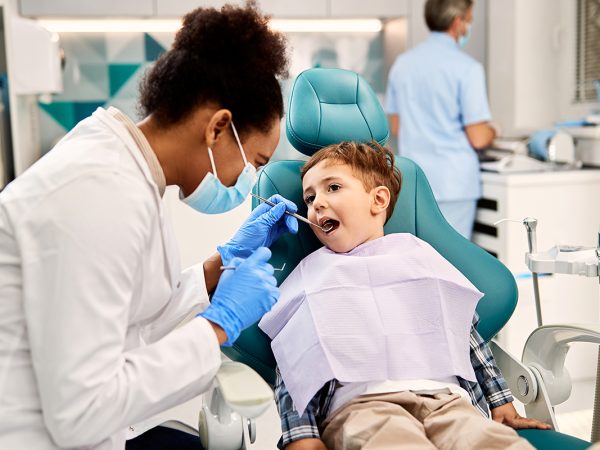Pediatric Dentistry
Should I Clean My Baby’s Teeth?
Absolutely! It's important to start dental care even before the first tooth emerges. Use a soft, clean cloth to gently wipe your baby's gums and cheeks after feedings. Once the first tooth appears, pediatric dentists recommend using a small, soft-bristled toothbrush to clean the tooth after meals. Avoid toothpaste for very young children, as they often swallow it. Excessive ingestion of fluoridated toothpaste can lead to dental fluorosis, which causes permanent spots on their teeth.

How Can I Make Brushing Easier?
Brushing can feel tricky, but there are helpful techniques. Try having your child lie down on your lap or the floor to stabilize their head. If they're standing, position them with their back to you and their head resting against your body. Let your child hold a mirror while you brush and floss so they can see what you’re doing, making it a more engaging experience.
Is Brushing Before Bed Important?
Yes, it's crucial! If you must skip a brushing session, bedtime brushing is the most important one. Neglecting to brush at night leaves bacteria and sugars to linger, which can lead to cavities. Saliva helps cleanse the mouth during the day, but its production decreases during sleep, making nighttime brushing essential.
Brushing Techniques for Your Child
Plaque accumulates on the teeth and gums throughout the day, making regular brushing vital for oral health. Use a toothbrush with soft, rounded bristles, and ensure it's appropriately sized for your child. Remember, children usually lack the dexterity needed for effective brushing until they're about 8-10 years old, so supervision is key. Replace toothbrushes when bristles become bent or frayed, and start flossing when your child's teeth begin to touch.
Teething
Teething can cause discomfort, leading to restlessness or irritability in babies. However, if symptoms like fever, vomiting, or diarrhea occur, consult your pediatrician, as these are not typically linked to teething.
Signs Your Baby Might Be Teething:
- Increased drooling
- Chewing on objects
- Irritability
- Child Dental Sealants
Sealants are thin coatings applied to the chewing surfaces of back teeth, which are prone to cavities. They act as a barrier, preventing food particles and bacteria from settling in the grooves of teeth. It’s best to apply sealants on permanent molars when they emerge around ages 6 and 12. Dr. Chad B. Kelly, at our practice, ensures proper application, enhancing protection against decay.
Sealants can last several years and should be checked during routine dental visits. Even if a sealant wears away, the enamel underneath still benefits from the protection it offered.
Thumb Sucking and Dental Health
Thumb or finger sucking is common in infants and usually resolves on its own by age four. If it persists past the eruption of permanent teeth, it could lead to crooked teeth and a malformed palate. The extent of the issue depends on how often and intensely the habit occurs.
Fluoride and Your Child's Dental Health
Dental decay is prevalent, but fluoride can help prevent it. It strengthens tooth enamel and can even reverse early decay through a process known as remineralization. Fluoride can be provided topically (via toothpaste or mouth rinses) or systemically (through diet or supplements).
First Dental Visit for Your Child
Aim for your child's first dental visit around their first birthday, or sooner if their first tooth appears. Here are some tips:
Do's:
Schedule a friendly introductory visit to familiarize your child with the office.
Discuss oral health care with our dental team.
Take your child along for sibling appointments to ease anxiety.
Don'ts:
Wait for a dental emergency to seek care.
Overprepare your child with worries about the visit.
Use phrases that imply discomfort, as they can heighten anxiety.
Baby Bottle Tooth Decay
Also known as Baby Bottle Syndrome, this condition arises from prolonged exposure of baby teeth to sugary liquids. The upper front teeth are most affected due to their early eruption. Avoid letting your child sleep with a bottle containing milk, juice, or sugary liquids, as these can lead to rapid decay.
Pacifiers and Dental Health
Using a pacifier can be a better alternative to thumb sucking, as it typically results in fewer dental issues and is easier to discontinue. Ensure you select a pacifier with a rubber nipple, avoid constant use, and check regularly for wear and tear.
Snack Habits and Dental Health
Frequent sugary snacks can increase the risk of cavities. Each time your child consumes sugar, bacteria in the mouth produce acids that can damage tooth enamel. Encourage a balanced diet rich in grains, dairy, meats, fruits, and vegetables, and limit sugary treats to foster healthy dental habits.

